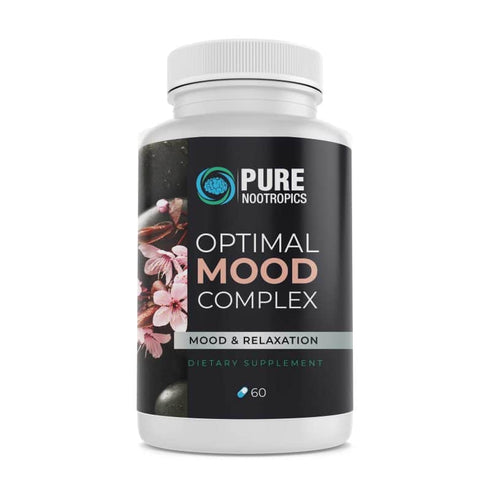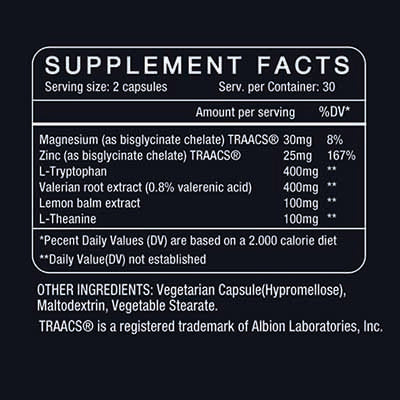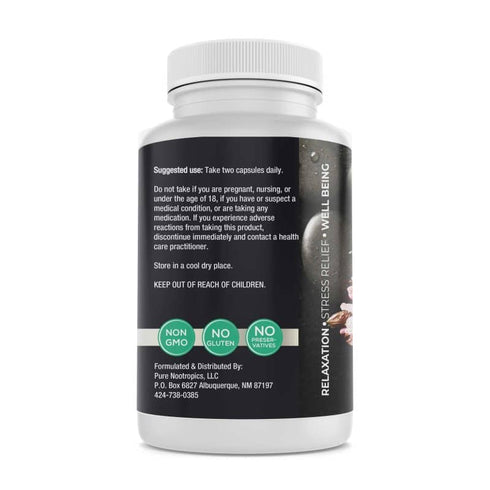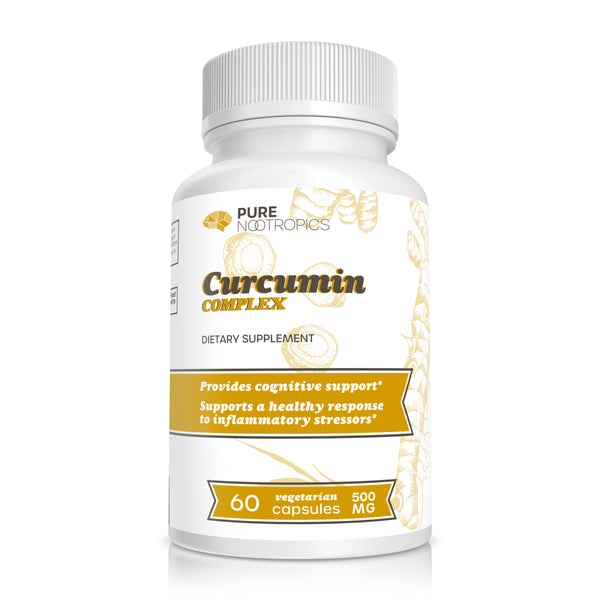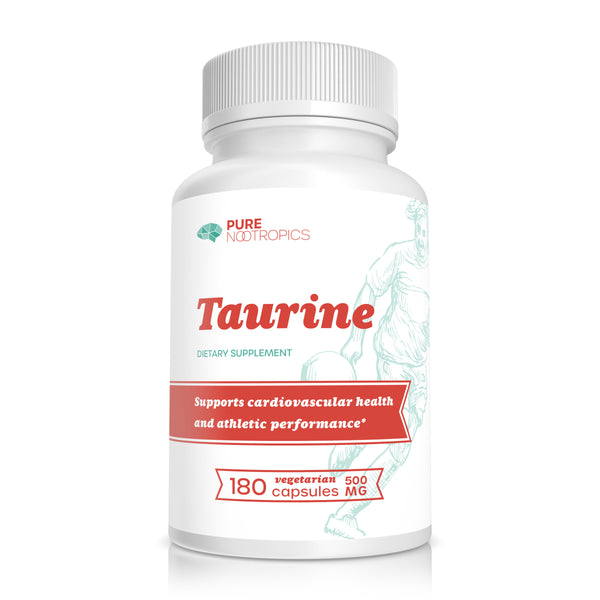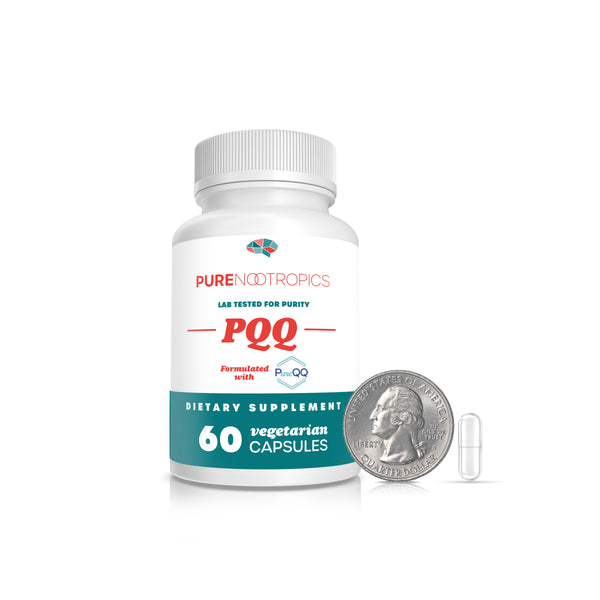Pure Nootropics’ Optimal Mood Complex is formulated with a blend of herbal extracts, minerals, and amino acids to help support a calm and relaxed mood.
Optimal Mood Complex Benefits
- Magnesium Bisglycinate Chelate promotes relaxation and mood support (ref)*
- Zinc Bisglycinate Chelate supports positive mood (ref)*
- Lemon Balm and Valerian Root Combination promotes a calm mood (ref)*
- L-Tryptophan supports relaxation (ref)*
- L-Theanine promotes a calm mood (ref)*
Optimal Mood Complex Mode of Action
Magnesium Bisglycinate Chelate is a mineral which promotes a calm mood through its ability to promote relaxation and calm the nervous system (2).
Zinc Bisglycinate Chelate is a trace element which regulates neurotransmitter systems and a deficiency in zinc can result in mood disturbance (17).
Lemon Balm and Valerian Root Combination is a combination of the herbal extracts of Lemon Balm and Valerian root.
They are often used together because they exhibit synergy that may improve mood and sleep. Lemon Balm acts as a GABA transaminase inhibitor; GABA is broken down into Glutamate by GABA transaminase, so the inhibition of this enzyme frees up more GABA in the brain. Valerian stimulates GABA by stimulating glutamate decarboxylase; glutamate is converted into GABA with this enzyme. The combination of Lemon Balm and Valerian is then able to stimulate the production of GABA within the brain by stimulating conversion of GABA and preventing the breakdown of GABA (4). Activation of GABA within the brain promotes sleep (5).
L-Tryptophan is an essential amino acid which is converted in the body into serotonin (6).
L-Theanine is an amino acid which naturally occurs in tea leaves and some forms of mushrooms
(8).
L-Theanine promotes relaxation and improves sleep quality due to its ability to provide relaxation by increasing alpha-brain waves and regulating excitatory neurotransmitters that may inhibit a calm mood or restful sleep. Alpha-brain waves (8-13 Hz) are the brain waves associated with relaxation and alertness and are produced within 30-40 minutes after ingestion. The alpha-brain waves (or “a-waves”) occur in the occipital and parietal regions of the brain and prepare the body for a relaxed state prior to sleep (9,10).
Optimal Mood Complex Dosage
Pure Nootropics’ Optimal Sleep Complex was formulated based on researched and recommended dosages.
Pure Nootropics’ Optimal Mood Complex provides 30 mg Magnesium Bisglycinate Chelate, 25 mg Zinc Bisglycinate Chelate, 400 mg L-Tryptophan, 400 mg Valerian root extract (standardized to 0.8% valerenic acid), 100 mg Lemon Balm extract, 100 mg L-Theanine per (2) capsules. Suggested use for adults is 2 capsules by mouth daily, or as directed by your healthcare practitioner.
For further information, please see our References Tab above.
The references below are not meant to imply that any of our products treat, cure, or diagnose any disease or human condition. References to clinical studies and pre-clinical studies may use varying dosages and may not represent the dosages or subsequent results of products we sell; however, the references provided are pertinent to the subject supplement itself. References provided are intended for research and informational purposes only and do not represent the entire body of knowledge available on the subject(s) referenced; nor do they represent all possible outcomes associated with the subject(s) referenced including, but not limited to, adverse effects, precautions, or chemical interactions within the human body. The Content provided on this website is not intended to be a replacement for professional medical advice, treatment or diagnosis. Never ignore the advice of a medical professional or delay in attaining professional advice because of information or impressions you gather on this website. Choosing to rely on any information provided by the Content of this website is solely at your own risk. We encourage our audience to do their own research beyond the resources we have provided so your decision is as educated as possible.
• Magnesium Bisglycinate Chelate promotes relaxation and mood support*
Boyle, Neil Bernard et al. “The Effects of Magnesium Supplementation on Subjective Anxiety and Stress-A Systematic Review.” Nutrients vol. 9,5 429. 26 Apr. 2017, doi:10.3390/nu9050429
• Zinc Bisglycinate Chelate supports positive mood*
Cope, EC, and CW Levenson. “Role of Zinc in the Development and Treatment of Mood Disorders.” Curr Opin Clin Nutr Metab Care, vol. 13, no. 6, Nov. 2010, doi:10.1097/MCO.0b013e32833df61a.
• Lemon Balm and Valerian Root Combination promotes a calm mood*
Kennedy, DO, et al. “Anxiolytic Effects of a Combination of Melissa Officinalis and Valeriana Officinalis during Laboratory Induced Stress.” Phytother Res., vol. 20, no. 2, Feb. 2006, pp. 96–102., www.ncbi.nlm.nih.gov/pubmed/16444660.
• L-Tryptophan supports relaxation*
Jenkins, Trisha A et al. “Influence of Tryptophan and Serotonin on Mood and Cognition with a Possible Role of the Gut-Brain Axis.” Nutrients vol. 8,1 56. 20 Jan. 2016, doi:10.3390/nu8010056
• L-Theanine promotes a calm mood*
White, DJ, et al. “Anti-Stress, Behavioural and Magnetoencephalography Effects of an L-Theanine-Based Nutrient Drink: A Randomised, Double-Blind, Placebo-Controlled, Crossover Trial.” Nutrients., vol. 8, no. 1, 19 Jan. 2016, doi:10.3390/nu8010053.
1. “Magnesium,” Examine.com, published on 8 December 2013, last updated on 15 October 2018, https://examine.com/supplements/magnesium/.
2. Cook, Sarah. “Chelated Minerals: Addressing Key Challenges in Mineral Supplementation”.Natural Medicine Journal, 2018, https://www.naturalmedicinejournal.com/sites/default/files/uploads/chelated_minerals.pdf.
3. Cherasse, Yoan and Yoshihiro Urade. “Dietary Zinc Acts as a Sleep Modulator” International journal of molecular sciences vol. 18,11 2334. 5 Nov. 2017, doi:10.3390/ijms18112334.
4. “Melissa Officinalis,” Examine.com, published on 26 March 2013, last updated on 14 June 2018, https://examine.com/supplements/melissa-officinalis/.
5. Gottesmann, C. “GABA Mechanisms and Sleep.” Neuroscience, no. 111, ser. 2, 2002, pp. 231–9. 2, www.ncbi.nlm.nih.gov/pubmed/11983310.
6. Steriti, Ronald. “How To Get a Good Night’s Sleep with Tryptophan.” pdfs.semanticscholar.org/26ec/a60446a9a5e725f6e5f08c5ec3a195fffd31.pdf.
7. Hartmann, E. “Effects of L-Tryptophan on Sleepiness and on Sleep.” J Psychiatr Res., vol. 17, no. 2, 1982, pp. 107–13., www.ncbi.nlm.nih.gov/pubmed/6764927.
8. “Theanine.” Food, Herbs & Supplements, Professional. Natural Medicines, Therapeutic Research, naturalmedicines.therapeuticresearch.com/databases/food,-herbs-supplements/professional.aspx?productid=1053.
9. Rao, Theertham P., et al. “In Search of a Safe Natural Sleep Aid.” Journal of the American College of Nutrition, vol. 23, pp. 436–447., www.grc.com/health/research/Sleep/In Search of a Safe Natural Sleep Aid.pdf
10. Nobre, AC, et al. “L-Theanine, a Natural Constituent in Tea, and Its Effect on Mental State.” Asia Pac J Clin Nutr., vol. 17, no. 1, pp. 167–8., www.ncbi.nlm.nih.gov/pubmed/18296328.
11. “Magnesium.” Food, Herbs & Supplements, Professional. Natural Medicines, Therapeutic Research, https://naturalmedicines.therapeuticresearch.com/databases/food,-herbs-supplements/professional.aspx?productid=998#toxicology.
12. “Zinc.” Food, Herbs & Supplements, Professional. Natural Medicines, Therapeutic Research, https://naturalmedicines.therapeuticresearch.com/databases/food,-herbs-supplements/professional.aspx?productid=982#adverseEvents.
13. “Valerian.” Drugs and Lactation Database (LactMed), 2006, www.ncbi.nlm.nih.gov/pubmed/30000874.
14. “Lemon Balm.” Drugs and Lactation Database (LactMed), 2006, www.ncbi.nlm.nih.gov/pubmed/30000874.
15. Institute of Medicine (2002). “Protein and Amino Acids”. Dietary Reference Intakes for Energy, Carbohydrates, Fiber, Fat, Fatty Acids, Cholesterol, Protein, and Amino Acids. Washington, DC: The National Academies Press. pp. 589–768.
16. “GRAS Notices.” U.S. Food & Drug Administration, www.accessdata.fda.gov/scripts/fdcc/index.cfm?set=GrASNotices&sort=Date_of_closure&order=ASC&showAll=true&type=basic&search=theanine.
17. Cope, EC, and CW Levenson. “Role of Zinc in the Development and Treatment of Mood Disorders.” Curr Opin Clin Nutr Metab Care, vol. 13, no. 6, Nov. 2010, doi:10.1097/MCO.0b013e32833df61a.


